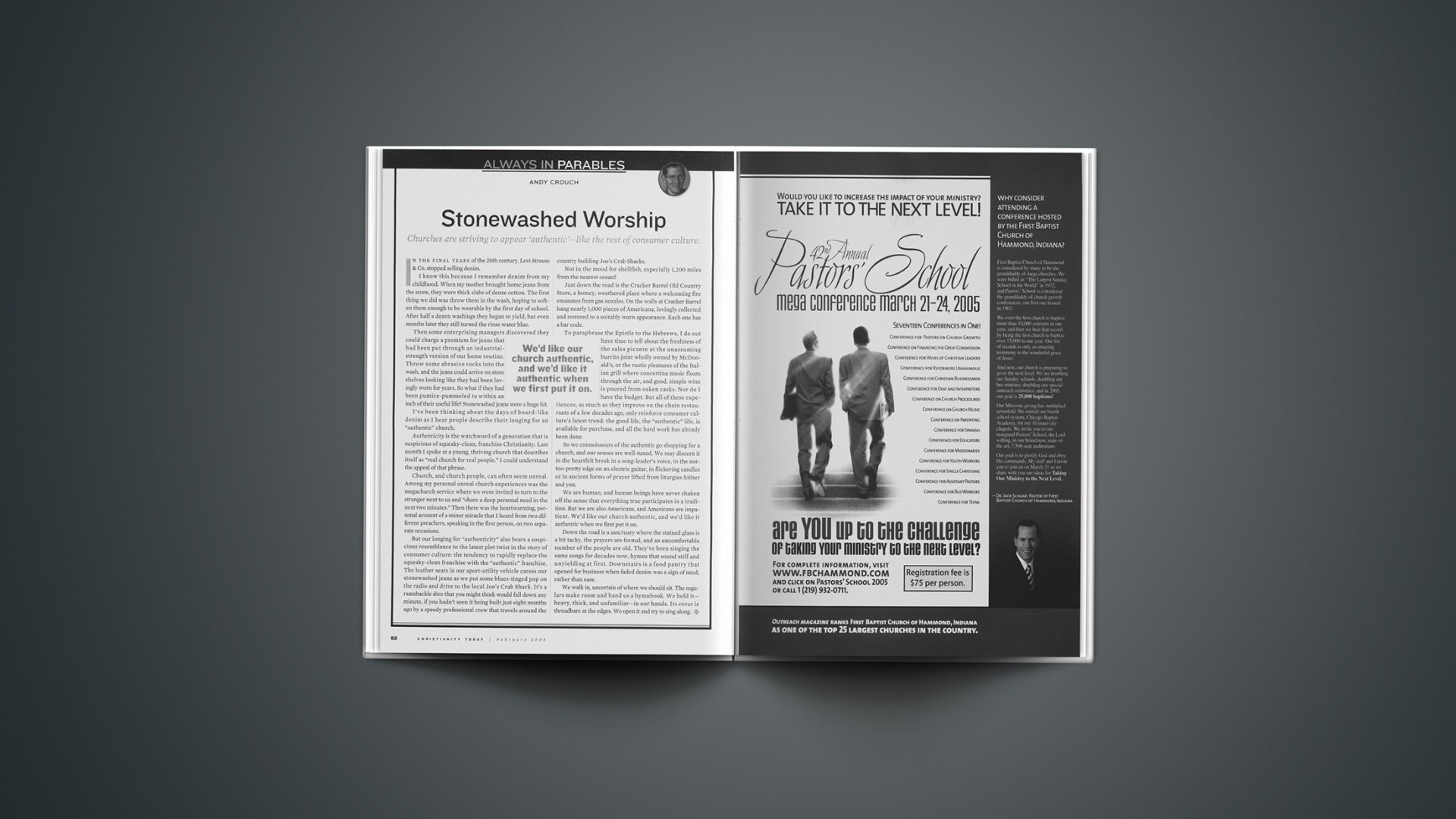In the final years of the 20th century, Levi Strauss & Co. stopped selling denim.
I know this because I remember denim from my childhood. When my mother brought home jeans from the store, they were thick slabs of dense cotton. The first thing we did was throw them in the wash, hoping to soften them enough to be wearable by the first day of school. After half a dozen washings they began to yield, but even months later they still turned the rinse water blue.
Then some enterprising managers discovered they could charge a premium for jeans that had been put through an industrial-strength version of our home routine. Throw some abrasive rocks into the wash, and the jeans could arrive on store shelves looking like they had been lovingly worn for years. So what if they had been pumice-pummeled to within an inch of their useful life? Stonewashed jeans were a huge hit.
I’ve been thinking about the days of board-like denim as I hear people describe their longing for an “authentic” church.
Authenticity is the watchword of a generation that is suspicious of squeaky-clean, franchise Christianity. Last month I spoke at a young, thriving church that describes itself as “real church for real people.” I could understand the appeal of that phrase.
Church, and church people, can often seem unreal. Among my personal unreal church experiences was the megachurch service where we were invited to turn to the stranger next to us and “share a deep personal need in the next two minutes.” Then there was the heartwarming, personal account of a minor miracle that I heard from two different preachers, speaking in the first person, on two separate occasions.
But our longing for “authenticity” also bears a suspicious resemblance to the latest plot twist in the story of consumer culture: the tendency to rapidly replace the squeaky-clean franchise with the “authentic” franchise. The leather seats in our sport-utility vehicle caress our stonewashed jeans as we put some blues-tinged pop on the radio and drive to the local Joe’s Crab Shack. It’s a ramshackle dive that you might think would fall down any minute, if you hadn’t seen it being built just eight months ago by a speedy professional crew that travels around the country building Joe’s Crab Shacks.
Not in the mood for shellfish, especially 1,200 miles from the nearest ocean?
Just down the road is the Cracker Barrel Old Country Store, a homey, weathered place where a welcoming fire emanates from gas nozzles. On the walls at Cracker Barrel hang nearly 1,000 pieces of Americana, lovingly collected and restored to a suitably worn appearance. Each one has a bar code.
To paraphrase the Epistle to the Hebrews, I do not have time to tell about the freshness of the salsa picante at the unassuming burrito joint wholly owned by McDonald’s, or the rustic pleasures of the Italian grill where concertina music floats through the air, and good, simple wine is poured from oaken casks. Nor do I have the budget. But all of these experiences, as much as they improve on the chain restaurants of a few decades ago, only reinforce consumer culture’s latest trend: the good life, the “authentic” life, is available for purchase, and all the hard work has already been done.
So we connoisseurs of the authentic go shopping for a church, and our senses are well-tuned. We may discern it in the heartfelt break in a song-leader’s voice, in the not-too-pretty edge on an electric guitar, in flickering candles or in ancient forms of prayer lifted from liturgies hither and yon.
We are human, and human beings have never shaken off the sense that everything true participates in a tradition. But we are also Americans, and Americans are impatient. We’d like our church authentic, and we’d like it authentic when we first put it on.
Down the road is a sanctuary where the stained glass is a bit tacky, the prayers are formal, and an uncomfortable number of the people are old. They’ve been singing the same songs for decades now, hymns that sound stiff and unyielding at first. Downstairs is a food pantry that opened for business when faded denim was a sign of need, rather than ease.
We walk in, uncertain of where we should sit. The regulars make room and hand us a hymnbook. We hold it—heavy, thick, and unfamiliar—in our hands. Its cover is threadbare at the edges. We open it and try to sing along.
Copyright © 2005 Christianity Today. Click for reprint information.
Related Elsewhere:
Andy Crouch wrote our cover story on the ultra-authentic Emergent church movement.
Our Good Question column looked at Authentic Fellowship in contemporary churches.
Chad Hall, in a column for our sister publication, Leadership Journal, says the church is becoming less an authentic church and more like a not-for-profit organization.
Earlier Andy Crouch columns for Christianity Today include:
When Backward Is Forward | Christmas may be the best argument against genetic enhancement. (Dec. 23, 2004)
Salt-and-Pepper Politics | Choosing between candidates whose consciences are too clean. (Oct. 04, 2004)
‘Live More Musically’ | The difference between Christian practice and a Starbucks purchase. (July 29, 2004)
The Cruel Edges of the World | There are some places that bring the distant biblical text closer to our lives. (June 07, 2004)
Pilgrims to Nowhere | Freedom isn’t much good if you don’t have a sense of direction. (March 30, 2004)
Glittering Images | A profound Christian rethinking of power is overdue (Feb. 17, 2004)
Before the Deluge | All of us have a sexual orientation that bends toward the self. (Dec. 03, 2003)
Two Weddings and a Baptism | It’s still impossible to predict what will advance the gospel in Hollywood. (Oct. 15, 2003)
Wrinkles in Time | Botox injections as a spiritual discipline. (Aug. 11, 2003)
Rites of Passage | Self-improvement is our culture’s most durable religion. (June 6, 2003)
Christian Esperanto | We must learn other cultural tongues. (June 4, 2003)
We’re Rich | But why is it so hard to admit? (Feb. 20, 2003)
Blinded by Pop Praise | To see God “high and lifted up,” just open your eyes. (Dec. 17, 2002)
The Future Is P.O.D. | Multicultural voices have an edge in reaching a rapidly changing America. (October 12, 2002)
Rekindling Old Fires | We can resist technology’s chilling effects on how we spend time together. (August 2, 2002)
Interstate Nation | The national highway system is a lesson in how to transform a nation. (June 21, 2002)










